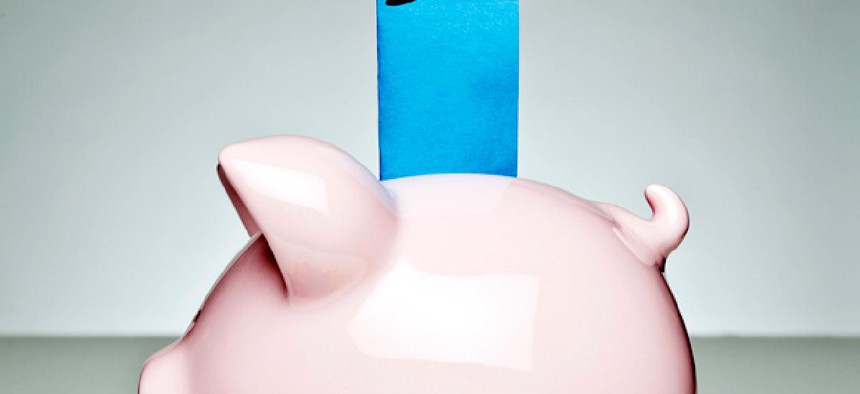
Thinkstock
The latest debt-ceiling proposal: Issue IOU's
Recipients could include federal employees and defense contractors, among others.
The $1 trillion platinum coin seems too wacky; the 14th amendment too risky. But could IOU's be the solution to an impasse on raising the nation's borrowing limit?
Yes, and President Obama should publicly adopt the idea, Edward Kleinbard, a University of Southern California law professor and former chief of staff to Congress’s Joint Committee on Taxation, argues in a Thursday New York Times op-ed. If lawmakers can’t reach an agreement before the nation hits its debt ceiling -- which could happen as soon as next month -- then Obama should have a backup plan of issuing IOU's in place, Kleinbard argues.
“[Obama] should threaten to issue scrip -- 'registered warrants' -- to existing claims holders (other than those who own actual government debt) in lieu of money. Recipients of these I.O.U.’s could include federal employees, defense contractors, Medicare service providers, Social Security recipients and others.”
Kleinbard is hardly the first to propose the idea. Slate’s Matt Yglesias suggested it in early December. And New York Times Op-Ed columnist and Nobel Prize winner Paul Krugman argued for such IOU’s on Monday, though he called them “Moral Obligation Coupons.” In Krugman and Kleinbard, the idea has found two prominent proponents.
Without congressional intervention, the government is expected to reach its debt ceiling in the second half of February, the Bipartisan Policy Center predicts. The only thing preventing a devastating national default, which could have ripple effects around the globe, are a handful of hail-mary proposals:
- One that calls for Treasury to use its power to create commemorative coins to mint a $1 trillion platinum coin. The idea has gained traction among some, but mostly as an absurd solution to an absurd problem.
- Obama could argue that the 14th amendment grants him the constitutional power to forge ahead with issuing new debt, as it states that “the validity of the public debt... shall not be questioned.” But he has ruled it out, saying “I have talked to my lawyers; they are not persuaded that that is a winning argument.”
- And then there’s a plan known as “prioritization,” which calls for the U.S. government to use incoming daily revenue first to pay the nation’s lenders to prevent a default, while deferring payments to some domestic programs such as Social Security, Medicare, Medicaid, and others. That idea has a proponent in Sen. Pat Toomey, R-Pa., though Treasury and at least one official at the credit-rating agency Standard & Poor’s have suggested it is a default by another name.
The appeal of the IOU, or scrip, lies in the fact that though it closely resembles debt, it isn’t, Kleinbard argues.
“It would merely be a formal acknowledgment of a pre-existing monetary claim against the United States that the Treasury was not currently able to pay,” Kleinbard argues. “The president could therefore establish a scrip program by executive order without piling a constitutional crisis on top of a fiscal one.”
Most importantly, the IOU scheme has a recent precedent. California issued nearly half-a-million such IOU’s as it dealt with a cash crisis in 2009. They provided enough cover for lawmakers to strike a deal quickly, without a hit to the state's credit rating.Republicans have signaled they may hold up a debt-ceiling increase in exchange for spending cuts, which they argue are necessary for the nation's long-term fiscal health. The President contends that reining in spending and reducing the deficit is important, but has vowed that he will not negotiate on the debt ceiling.
NEXT STORY: Play of the Day: Muskets for all!






